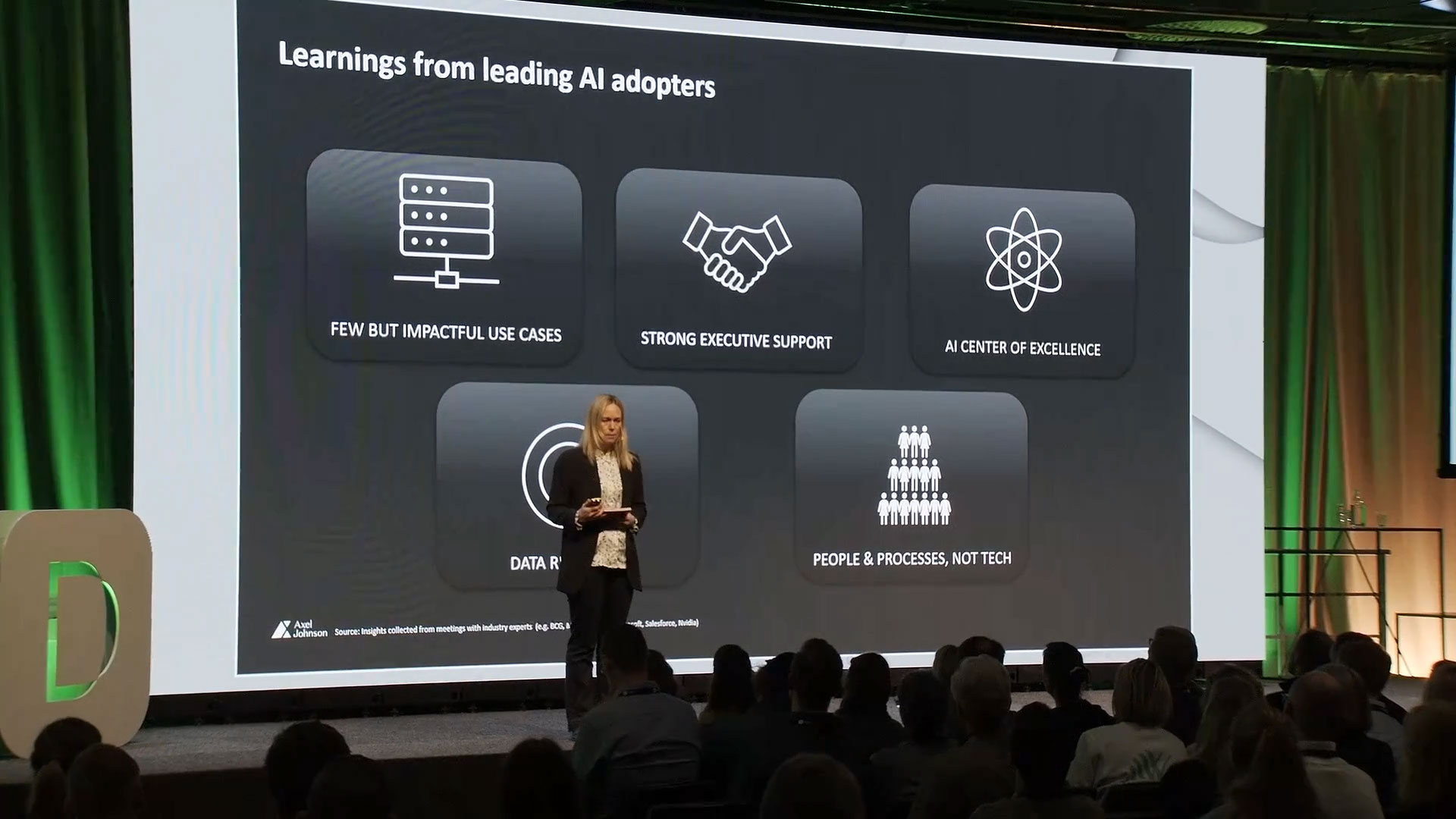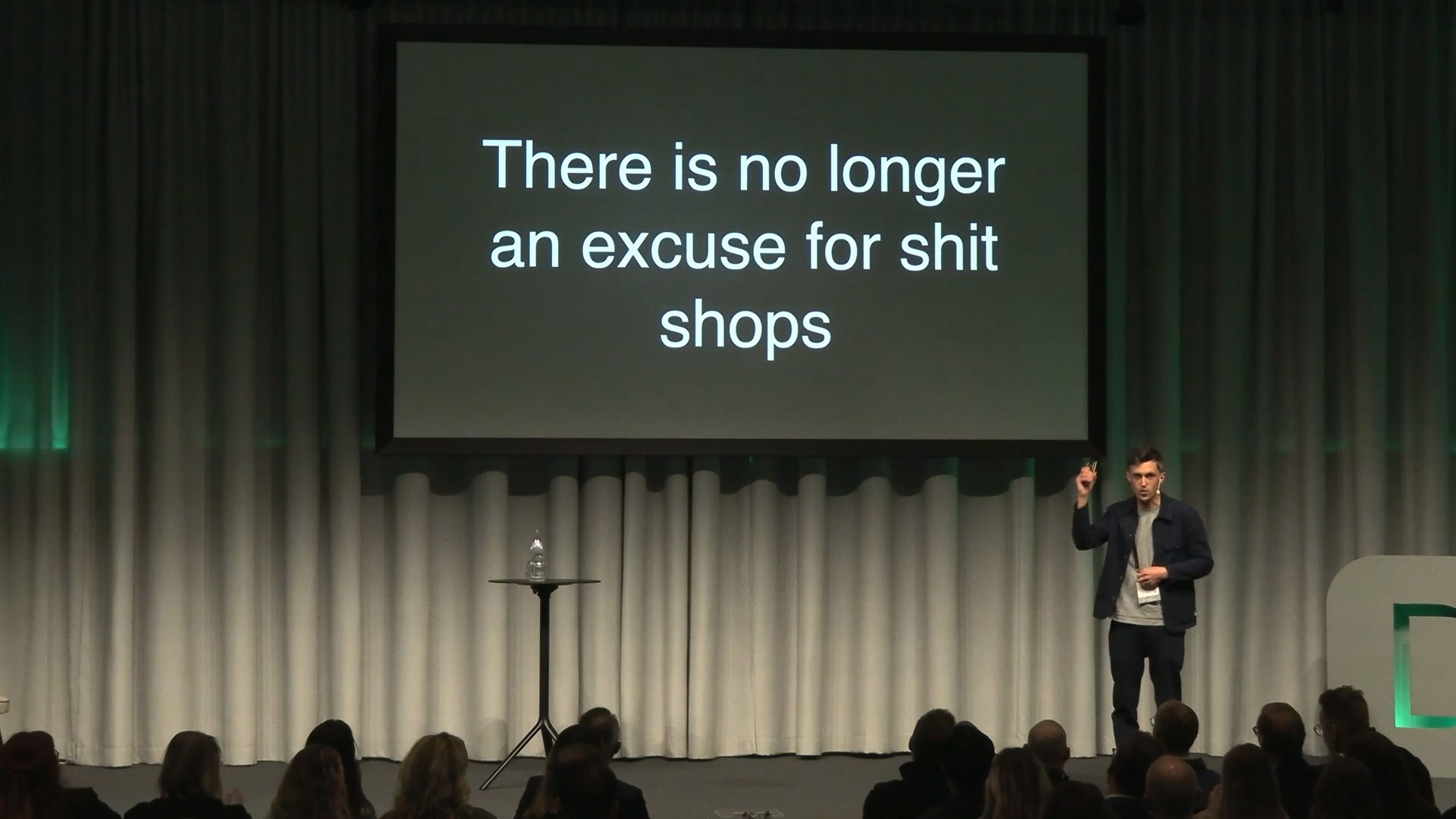
Sweden’s Prime Minister Ulf Kristersson inaugurated D-Congress and had both an opening speech and then a conversation with Swedish Commerce's Head of Business Policy and Opinion Formation, Martin Kits. We are grateful that the Prime Minister recognizes the importance of entrepreneurship for Sweden's future and growth to make a visit to our world in his now even more hectic schedule between extraordinary EU summits. He highlighted the security situation both in the outside world and in internal security.
It turns out that Ulf sometimes ends meetings by asking what the operational conclusion is? He thinks it is a good idea to think about what kind of thing you can act on given what you know right now. Even if you may have to change the conclusion the day after tomorrow when you know more, it is good to stop and see where you stand and what to do given what you know today.
He talks about the importance of AI, that it is probably a good idea to focus on a few areas first that have great benefit from it. According to the AI Commission, they were the first to request a shortened time to submit their report because it is urgent to get started with certain initiatives.

Ulf highlighted what many others have said about the fact that we are faced with many rules and regulations within the EU that may not exist in the same way in the US or China.
He believes that it is important to do it so that it works and follows the rules, but without complicating things for Swedish companies unnecessarily. He promises that they will try to ensure that this does not happen in the future. Ulf says that he would also like to look at it retroactively, but that it is a more difficult process. He talks about the importance of not creating a reporting hysteria and that it is not sustainable to have global competition where a number of countries circumvent the regulations in a way that was not intended but that results in prices so low that several consumers will buy from them. And where there is also no access to their markets in the same way for our companies, it will not be a level playing field.
Shaping the future of retail
Axel Johnson shared their vision for AI and how it will affect business and consumer behaviour. With over 300 companies in their portfolio, such as Axfood, Dustin and Martin & Servera, Hanna Graflund Sleyman, EVP Emerging Technology at Axel Johnson, sees great potential for streamlining operations with AI. Since 2017, they have been working with analytical AI, and currently have over 150 AI models in the business to, among other things, reduce food waste and personalize the customer journey. They also have around 50 generative AI initiatives that are unlike how they have worked with AI before in the group. Most of the companies she talks to are in phase 1 where they are seeing how different initiatives can fit into their existing models and operations. But what awaits in phase 2? This will mean that companies need to rethink how they work, how they will meet customers. Hanna compares it to when the Internet came, and we quickly realized that we could send emails instead of letters and digitize catalogues and create websites with the information. But we didn't see that social media, for example, would come in phase 2, or how smartphones would affect how we shop.

2025, she predicts, will be the year they see what really works, what brings value in this technology shift. She shares what they have learned so far that works when they look at outcomes from 2024:
- Start with a few powerful projects. They have looked at where the real value lies for their business and focused on those areas to innovate with generative AI. They had a clear change management program to ensure they move forward with those projects.
- Strong support from management. You need support from top management if you are going to succeed with something like this, a forward-leaning management that explains to the entire business why you should work on this.
- Team of AI experts. Many of them had a team of AI experts that employees could turn to with questions and concerns. They are also responsible for making sure the projects actually move forward.
- Focus on data. As you hear from many different sources, it is important to have a strong focus on data to succeed with AI projects.
- Focus on people and processes, not technology. They think it is important not to see it as a technical issue, to drive change is a question of leadership and the ability to create value for the different processes.
At Axel Johnson, they are looking extra closely at a couple of things right now. Generative AI is particularly good at conversational and reasoning skills. These can improve many services if implemented correctly. For e-commerce, for example, it could be about shopping assistants, where instead of just using the search box, customers can be guided like they would be by employees in a store with comparisons, follow-up questions and advice. When Hanna spoke to Nvidia about their experiences, they experienced 10-20% higher conversion when customers used shopping assistants on the site. At Armani, they had even registered 50% higher conversion among customers who used this form of help instead of a regular search box.
According to a study from CapGemini 2025, 25% are already using this for shopping to get guidance. If you only look at the younger generation, the figure is a full 40%. For merchants, this will mean that fewer results will be displayed, fewer will visit the site in search of the information that the response engine now presents directly to the user. It will be important for retailers to rework digital strategies to present even more relevant information.
Agents are something that Axel Johnson monitors closely. We usually talk about agents who not only reason but also complete tasks. They can break down complex tasks, adapt to new situations and act proactively. Hanna talks about three different types of agents that are relevant to merchants – workforce agents, commercial agents and personal agents.
There is a lot of exciting technology waiting for us in the future, no one really knows what it will lead to, or which solutions will work best, but we know that it will happen quickly.
Insights from stores and consumers around the world
Jack Stratten, Head of Trends at Insider Trends, offered many interesting insights from the retail world as usual.

He started talking about different trends for consumers and the market in general.
- A saturated market. We have seen it for some time, we are fed more and more products and information. Shein releases between 2,000 -10,000 new products every day, that is more than 30 times as many as any other competitor. Not only are the big e-commerce companies satisfied with their business, but they also sometimes look at how they can copy their competitors to add another business model. If we look at second-hand sales, we also see an increase there. If we continue to look at Shein, there are approximately 20 million products from there for sale on Vinted. With today's and tomorrow's technology, Jack predicts that the market will become even more saturated.
- The disloyal consumer. There is an increased level of disloyalty from customers, not least during recessions when consumers tend to become more disloyal to brands. One new thing we have seen is that 64% state that they are overwhelmed by choice. It is believed that customers want a large selection, but it is more about wanting the right selection.
Jack thinks TikTok Shop deserves more attention in the West, as a form of marketplace they made more profit in the US than Shein in Q4 2024. But it is not a marketplace but an extension of social media and the whole basic idea of social commerce where you sell products to your followers. Even though there are a lot of junk products sold there, it is still massive sales.
He went on to talk about some trends for brands and stores.
- The power of news. In a saturated market, news has power, we consumers like new things. Not just new products, but also new companies that challenge the way we have traditionally done things. He recommends taking a look at new companies to see what they are doing to innovate their existing business for the better.
- Find identity and meaning. Jack thinks it is important that it is possible to find an identity and meaning in a store when much can be bought online. What is the purpose of the store? It is important to remember that it does not only have to be about selling. He gives examples of everything from a place where a community for the brand is built or a place to create content that consumers share online to a place to discover news.
- The value of originality. Today, when much is quite similar, most fashion stores look about the same, beauty stores the same, there is value in trying to be original and stand out from the noise and not do things the same way as everyone else.
At NRF, Jack saw a study presented where the main reasons for not shopping in physical stores were clutter, lack of staff and the inability to find what they were looking for. It's about going back to the basics of sales to create stores that customers want to visit.

A huge thank you to everyone who came and talked to us, both at the 3bits booth and around the fair, various seminars and all the nice opportunities that were given to socialize and network during D-Congress.
